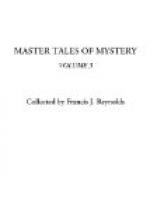To one like myself who had read of the Continental gambling-houses with the clink of gold pieces on the table, and the croupier with his wooden rake noisily raking in the winnings of the bank, the comparative silence of the American game comes as a surprise.
As we advanced, we heard only the rattle of the ball, the click of the chips, and the monotonous tone of the spinner: “Twenty-three, black. Eight, red. Seventeen, black.” It was almost like the boys in a broker’s office calling off the quotations of the ticker and marking them up on the board.
Leaning forward, almost oblivious to the rest, was Percival DeLong, a tall, lithe, handsome young man, whose boyish face ill comported with the marks of dissipation clearly outlined on it. Such a boy, it flashed across my mind, ought to be studying the possible plays of football of an evening in the field-house after his dinner at the training-table, rather than the possible gyrations of the little platinum ball on the wheel.
“Curse the luck!” he exclaimed, as “17” appeared again.
A Hebrew banker staked a pile of chips on the “17” to come up a third time. A murmur of applause at his nerve ran through the circle. DeLong hesitated, as one who thought, “Seventeen has come out twice—the odds against its coming again are too great, even though the winnings would be fabulous, for a good stake.” He placed his next bet on another number.
“He’s playing Lord Rosslyn’s system, to-night,” whispered my friend.
The wheel spun, the ball rolled, and the croupier called again, “Seventeen, black.” A tremor of excitement ran through the crowd. It was almost unprecedented.
DeLong, with a stiffed oath, leaned back and scanned the faces about the table.
“And ‘17’ has precisely the same chance of turning up in the next spin as if it had not already had a run of three,” said a voice at my elbow.
It was Kennedy. The roulette-table needs no introduction when curious sequences are afoot. All are friends.
“That’s the theory of Sir Hiram Maxim,” commented my friend, as he excused himself reluctantly for another appointment. “But no true gambler will believe it, monsieur, or at least act on it.”
All eyes were turned on Kennedy, who made a gesture of polite deprecation, as if the remark of my friend were true, but—he nonchalantly placed his chips on the “17.”
“The odds against ‘17’ appearing four consecutive times are some millions,” he went on, “and yet, having appeared three times, it is just as likely to appear again as before. It is the usual practice to avoid a number that has had a run, on the theory that some other number is more likely to come up than it is. That would be the case if it were drawing balls from a bag full of red and black balls—the more red ones drawn the smaller the chance of drawing another red one. But if the balls are put back in the bag after being drawn the chances of drawing a red one




